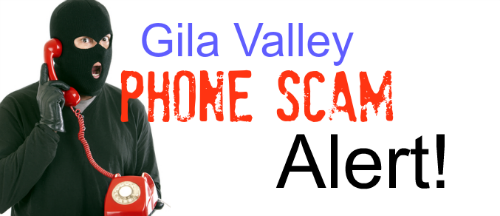On Monday, May 16, a Mrs Birda contacted the Graham County Sheriff’s office to report that she had received a call from a man saying that she had won a large amount of money. However, the man who called her said that he needed her to pay at least three thousand dollars so that he could process paperwork and fees. Gila Valley residents be warned, this is a scam. Luckily, Mrs. Birda called the Sheriff’s Department instead of giving this man any money.
The man who called Mrs. Birda was orchestrating a hoax. Even though he gave her multiple confirmation numbers and another phone number for her to call, he was never intending on giving Birda any money. Instead, the con artist was going to take her three thousand dollars and leave her empty handed.
When an individual wins a contest, the individual never has to pay any fees for paperwork or processing. Do not be fooled by this phone scam. According to the Truecaller/Harris survey, phone scammers cost the American public approximately $8.6 billion dollars annually. Surprisingly enough, according to statistics, men are more likely to be fooled by a phone scam than women. In 2015, approximately twenty-seven million Americans were victimized by phone scams.
Here are several ways to avoid being scammed by phone hoaxes:
Always do research first. Before you give your information, money, or any valuable information of any sort, call the police or do an online search.
Spot the imposters. Sometimes scammers pose as a government official, a family member or a charity. Don’t send money or give any personal information as a response to an unexpected request via text, phone call, or email.
Do not believe your caller ID. Technology is easily thwarted in this day in age. Scammers can easily fake caller ID info. If someone calls asking for personal information or money, hang up.
Do your research: Google the company or product name with words like “review” “Complaint,” or “Scam.” Or search for a phrase that describes the situation.
Do not pay for a promised reward. If they ask for money advances in debt relief, loan offers, mortgage assistance, jobs, or prizes in exchange for rewards are all fraudulent scams. They will take your money, and you will never see any money in exchange for it.
Think about the way they are asking you to pay them. Credit cards usually have fraud protection. However, Western Union or MoneyGram is a risky money movement because it has no fraud insurance.
Hang up immediately on recorded calls. Recorded sales pitches are almost always scams.









.jpg)